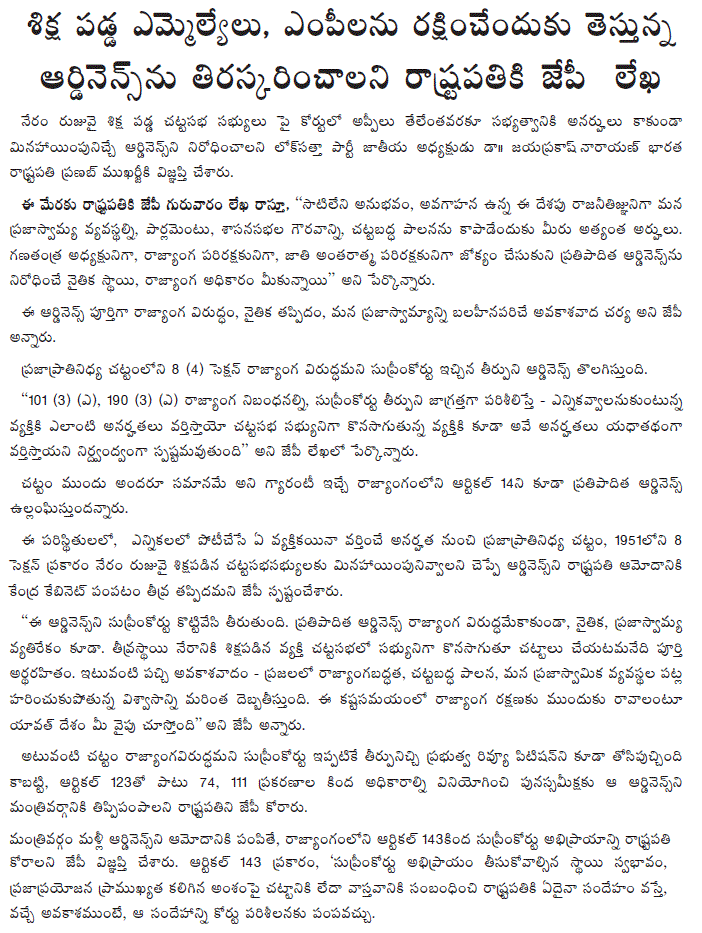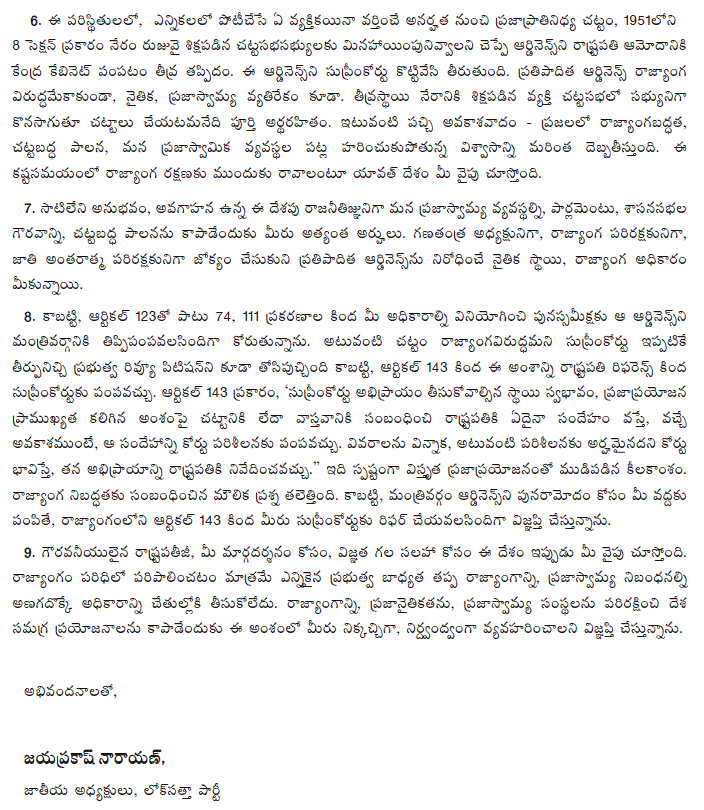Press Releases Archive
Abort Ordinance to save convicted legislators, Dr.JP urges President Pranab
Lok Satta Party national President Dr. Jayaprakash Narayan today urged President Pranab Mukherjee to prevent promulgation of an Ordinance to exempt convicted legislators from disqualification until the appeal is disposed of.
In a letter to the President, Dr. JP said, “As the elder statesman of the country with unmatched experience and erudition, you are best qualified to protect our democratic institutions, dignity of Parliament and State Legislatures, and rule of law. As the President of the Republic, defender of the Constitution, and conscience keeper of the nation, you have the moral stature and Constitutional authority to intervene and prevent promulgation of the proposed Ordinance.”
The Ordinance is a blatantly unconstitutional, morally wrong and cynical move that will weaken our democracy, said Dr. JP.
The Ordinance seeks to overturn the Supreme Court judgment of July 10 holding Section 8 (4) of the Representation of the People Act us ultra vires.
Dr. JP said, “A careful reading of Articles 101(3)(a) and 190(3)(a) of the Constitution and the Supreme Court’s judgment makes it unambiguously clear that any disqualification that applies to a person for being elected applies equally to an incumbent legislator for continuing as a member.”
The proposed Ordinance also violates Article 14 of the Constitution which says that the State shall not deny to any person equality before the law.
Dr. JP told the President that the Union Cabinet has erred in recommending promulgation of the Ordinance exempting incumbent legislators convicted of a crime under Section 8 of the RP Act, 1951 from disqualification that would apply to any person contesting for elective office.
“This Ordinance is bound to be struck down by the Supreme Court. Apart from the unconstitutionality of the proposed Ordinance, it is morally reprehensible and democratically indefensible. It is absurd to claim that an incumbent legislator convicted of a serious a crime can continue to be a lawmaker. Such a brazen act of cynicism will further undermine people’s already eroding faith in Constitutionalism, rule of law and our democratic institutions. The nation looks up to you to come to the defense of Constitution in this difficult hour.”
Dr. JP urged the President to invoke his powers under Article 123, read with Articles 74 and 111, and return the Ordinance to the Council of Ministers for reconsideration considering that the Supreme Court had already held such a law unconstitutional, and subsequently rejected a review petition filed by the Government.
If the Council of Ministers resubmits the Ordinance for his assent, Dr. JP requested the President to refer it to the Supreme Court for its opinion under Article 143 of the Constitution. Under Article 143, “if at any time it appears to the President that a question of law or fact has arisen, or is likely to arise, he may refer the question to the Supreme Court.”
Dr.JP's Letter to the President of India
26th September 2013
To
Shri Pranab Mukherjee
The President of India
Rashtrapati Bhavan,
New Delhi - 110001
Esteemed Rashtrapati Shri Pranab Mukherjee ji,
1. The reported Union Cabinet decision to recommend promulgation of an Ordinance to exempt convicted legislators from disqualification until the appeal is disposed of is a blatantly unconstitutional, morally wrong, cynical move that will weaken our democracy.
2. The Supreme Court in its July 10 verdict in WPs No 490 and 231 of 2005 held unequivocally that “Parliament had no power to enact sub-section (4) of Section 8 of the Act and accordingly subsection (4) of Section 8 of the Act is ultra vires the Constitution” (Para 22). The Court, in this judgment, relied on the wording and intent of Articles 102(1)(e) and 191(1)(e) of the Constitution. The Court in Para 20 held: “Looking at the affirmative terms of Articles 102(1)(e) and 191(1)(e) of the Constitution, we hold that Parliament has been vested with the powers to make law laying down the same disqualifications for (a) person to be chosen as a member of Parliament or a State Legislature and for a sitting member of a House of Parliament or a House of a State Legislature”. The Court further held: “the provisions of Articles, 101(3)(a) and 190(3)(a) of the Constitution expressly prohibit Parliament to defer the date from which the disqualification will come into effect in case of a sitting member of Parliament or a State Legislature. Parliament, therefore, has exceeded its powers conferred by the Constitution in enacting sub-section (4) of Section 8 of the Act and accordingly sub-section (4) of Section 8 of the Act is ultra vires the Constitution.”
3. Article 102(1)(e) states as follows: “As person shall be disqualified for being chosen as, and for being a member of either House Parliament ………………………………… e) if he is so disqualified by or under any law made by Parliament.”
Article 101(3)(a) states as follows: “If a member of either House of Parliament becomes subject to any of the disqualifications mentioned in clause (1) or clause (2) of Article 102, his seat shall thereupon become vacant.”
Identical provisions exist in respect of State Legislatures in Articles 191(1)(e) and 190(3)(a) of the Constitution.
4. A careful reading of these Constitutional provisions and the Supreme Court’s judgment makes it unambiguously clear that any disqualification that applies to a person for being elected applies equally to an incumbent legislator for continuing as a member. It is a settled legal principle that the Supreme Court has both the power and duty of judicial review of a legislation or executive decision under Articles 32, 141 and 142.
5. In addition, Article 14 of the Fundamental Rights chapter of the Constitution explicitly guarantees, “the State shall not deny to any person equality before the law, or equal protection of the laws within the territory of India.” Section 8 (4) of RP Act, 1951 or its variant in the form of the Ordinance for which the Union Government now is reportedly seeking the President’s assent is clearly violative of Article 14, in addition to being violative of Articles 190, 191, 101 and 102 of the Constitution.
6. Under these circumstances, the Union Cabinet has erred egregiously in recommending to the President the promulgation of the Ordinance exempting incumbent legislators convicted of a crime under Section 8 of the RP Act, 1951 from disqualification that would apply to any person contesting for elective office. This Ordinance is bound to be struck down by the Supreme Court. Apart from the un-Constitutionality of the proposed Ordinance, it is morally reprehensible and democratically indefensible. It is absurd to claim that an incumbent legislator convicted of a serious a crime can continue to be a lawmaker. Such a brazen act of cynicism will further undermine people’s already eroding faith in Constitutionalism, rule of law and our democratic institutions. The nation looks up to you to come to the defense of Constitution in this difficult hour.
7. As the elder statesman of the country with unmatched experience and erudition, you are best qualified to protect our democratic institutions, dignity of Parliament and State Legislatures, and rule of law. As the President of the Republic, defender of the Constitution, and conscience keeper of the nation, you have the moral stature and Constitutional authority to intervene and prevent promulgation of the proposed Ordinance.
8. I therefore urge you to invoke your powers Under Article 123, read with Articles 74 and 111, and return the Ordinance for the reconsideration of the Council of Ministers. Considering that the Supreme Court had already held such a law unconstitutional, and subsequently rejected a review petition filed by the Government on the subject, this is also a fit case for a Presidential reference of the matter to the Supreme Court under Article 143. Under Article 143, “if at any time it appears to the President that a question of law or fact has arisen, or is likely to arise, which is of such a nature and of such public importance that it is expedient to obtain the opinion of the Supreme Court upon it, he may refer the question to that court for consideration and the Court may, after such hearing as it thinks fit, report to the President its opinion thereon.” This is a clear case of great public importance, and a fundamental question of constitutional validity has arisen. Therefore, if the Council of Ministers resubmits the Ordinance for your assent, I urge you to refer it to the Supreme Court under Article 143 of the Constitution.
9. Esteemed Rashtrapatiji, the nation now looks up to you for guidance and wise counsel. An elected government has only the duty to govern under the Constitution, but cannot arrogate to itself the power to undermine the Constitution and democratic norms. I appeal to you to act in this case decisively and in the best interests of the nation in order to uphold the Constitution, public morality and democratic institutions.
With warm personal regards
Yours sincerely
Jayaprakash Narayan
National President
Lok Satta Party
Lok Satta refutes YSRCP charges
The Lok Satta Party today condemned YSRCP leaders Konatala Ramakrishna and D. A. Somayajulu for distorting Lok Satta Party national President Dr. Jayaprakash Narayan’s remarks on Mr. Y. S. Jaganmohan Reddy.
Lok Satta Party State Vice President D. V. V. S. Varma pointed out in a media statement that Dr. JP did not make any adverse comments on Mr. Jagan being granted bail. Dr. JP wanted Mr. Jagan’s trial be fast tracked since it attracted national attention like the Nirbhaya case. In fact, Dr. JP wanted all corruption cases involving VIPs like Madhu Koda, Sukhram, Jayalalitha, Mayavati and Lalu Prasad Yadav be tried by fast-track special courts and people’s faith in rule of law restored.
Mr. Varma also refuted the charge that Dr. JP maintained silence on corruption charges against TDP President and former Chief Minister N. Chandrababu Naidu. He recalled that when Chief Minister Dr. Y. S. Rajasekhara Reddy and Mr. Chandrababu Naidu traded charges of corruption against each other in the Assembly in 2007, it was Dr. JP who demanded constitution of a special court to go into the charges. Dr. JP reiterated the demand for constitution of special courts and appointment of independent prosecutors on April 1, 2008 during a special discussion in the Assembly on disproportionate assets of legislators. In 2009, Dr. JP drafted a Bill providing for the institution of a strong Lokayukta and circulated it (on June 10) among all party leaders.
Mr. Varma said making baseless allegations to besmirch the image of Dr. JP, who has been waging a relentless fight against corruption in public life, is reprehensible.



